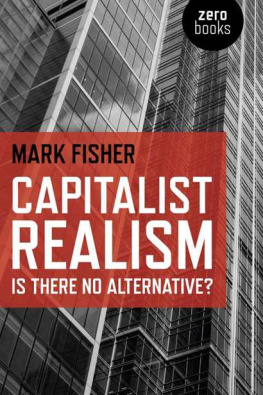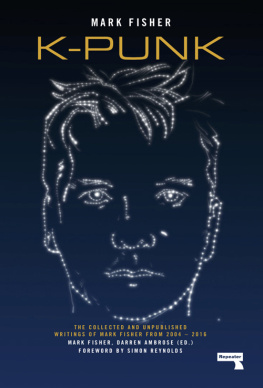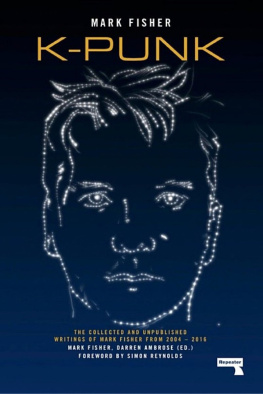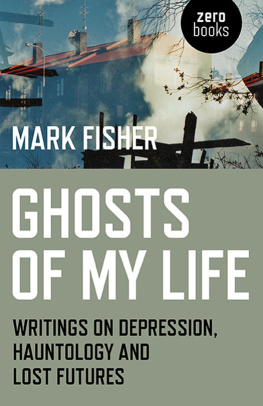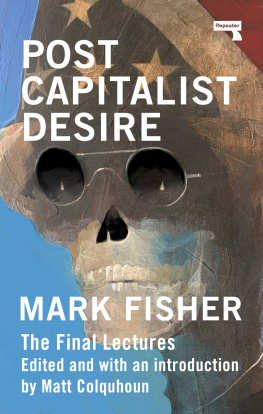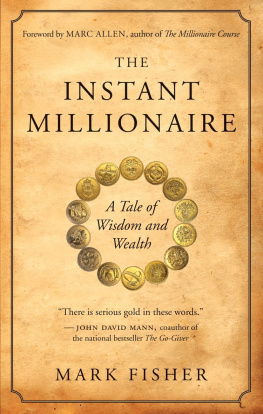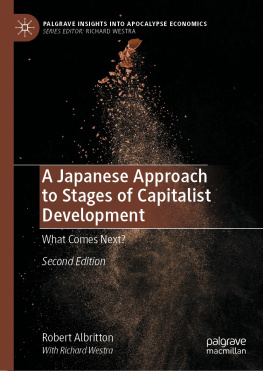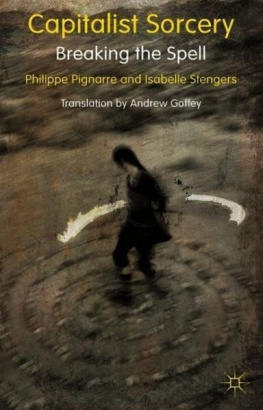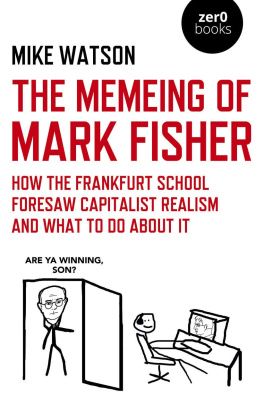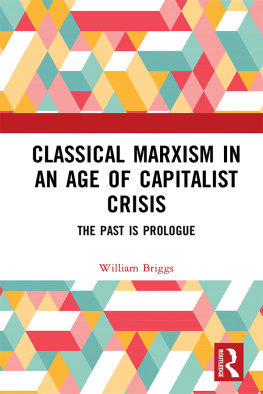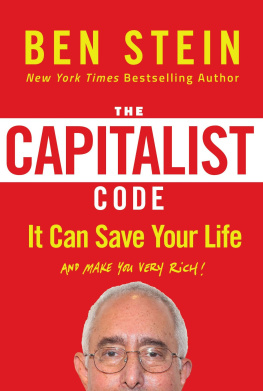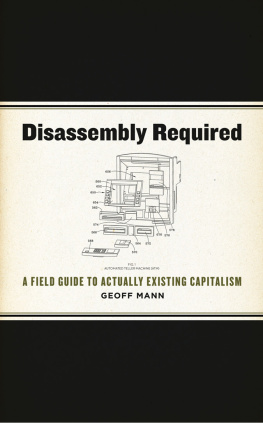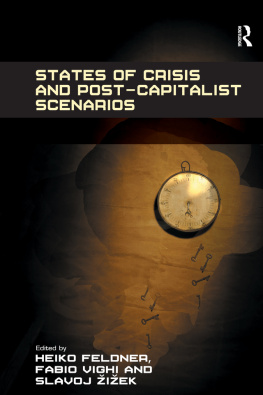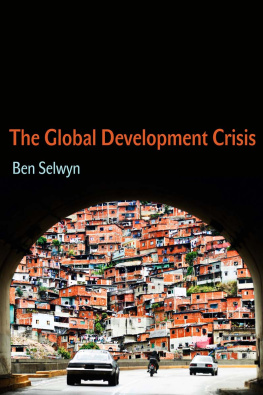Capitalist
Realism
Is There No Alternative?
First published by O Books, 2009
O Books is an imprint of John Hunt Publishing Ltd., The Bothy, Deershot Lodge, Park Lane, Ropley, Hants, SO24 0BE, UK
www.o-books.net
Distribution in:
UK and Europe
Orca Book Services
Tel: 01202 665432 Fax: 01202 666219
Int. code (44)
USA and Canada
NBN
Tel: 1 800 462 6420 Fax: 1 800 338 4550
Australia and New Zealand
Brumby Books
Tel: 61 3 9761 5535 Fax: 61 3 9761 7095
Far East (offices in Singapore, Thailand,
Hong Kong, Taiwan)
Pansing Distribution Pte Ltd
Tel: 65 6319 9939 Fax: 65 6462 5761
South Africa
Stephan Phillips (pty) Ltd
Email:
Tel: 27 21 4489839 Telefax: 27 21 4479879
Text copyright Mark Fisher 2008
Design: Stuart Davies
ISBN: 978 1 84694 317 1
All rights reserved. Except for brief quotations in critical articles or reviews, no part of this book may be reproduced in any manner without prior written permission from the publishers.
The rights of Mark Fisher as author have been asserted in accordance with the Copyright, Designs and Patents Act 1988.
A CIP catalogue record for this book is available from the British Library.
Printed by Digital Book Print
O Books operates a distinctive and ethical publishing philosophy in all areas of its business, from its global network of authors to production and worldwide distribution.
Capitalist
Realism
Is There No Alternative?
Mark Fisher

Winchester, UK
Washington, USA
Mark Fisher is a writer, theorist and teacher. His writing regularly appears in frieze, New Statesman, The Wire and Sight & Sound. He was a founding member of the Cybernetic Culture Research Unit. He is now a Visiting Fellow in the Centre for Cultural Studies at Goldsmiths, University of London and a tutor in Philosophy at the City Literary Institute, London. His weblog can be found at http://k-punk.abstractdynamics.org. He is married and lives in Suffolk.
To my wife, Ze, my parents, Bob and Linda, and the readers of my website
1
Its easier to imagine the end of the world than the end of capitalism
In one of the key scenes in Alfonso Cuarns 2006 film Children of Men, Clive Owens character, Theo, visits a friend at Battersea Power Station, which is now some combination of government building and private collection. Cultural treasures Michelangelos David, Picassos Guernica, Pink Floyds inflatable pig are preserved in a building that is itself a refurbished heritage artifact. This is our only glimpse into the lives of the elite, holed up against the effects of a catastrophe which has caused mass sterility: no children have been born for a generation. Theo asks the question, how all this can matter if there will be no-one to see it? The alibi can no longer be future generations, since there will be none. The response is nihilistic hedonism: I try not to think about it.
What is unique about the dystopia in Children of Men is that it is specific to late capitalism. This isnt the familiar totalitarian scenario routinely trotted out in cinematic dystopias (see, for example, James McTeigues 2005 V for Vendetta). In the PD. James novel on which the film is based, democracy is suspended and the country is ruled over by a self-appointed Warden, but, wisely, the film downplays all this. For all that we know, the authoritarian measures that are everywhere in place could have been implemented within a political structure that remains, notionally, democratic. The War on Terror has prepared us for such a development: the normalization of crisis produces a situation in which the repealing of measures brought in to deal with an emergency becomes unimaginable (when will the war be over?)
Watching Children of Men, we are inevitably reminded of the phrase attributed to Fredric Jameson and Slavoj iek, that it is easier to imagine the end of the world than it is to imagine the end of capitalism. That slogan captures precisely what I mean by capitalist realism: the widespread sense that not only is capitalism the only viable political and economic system, but also that it is now impossible even to imagine a coherent alternative to it. Once, dystopian films and novels were exercises in such acts of imagination the disasters they depicted acting as narrative pretext for the emergence of different ways of living. Not so in Children of Men. The world that it projects seems more like an extrapolation or exacerbation of ours than an alternative to it. In its world, as in ours, ultra-authoritarianism and Capital are by no means incompatible: internment camps and franchise coffee bars co-exist. In Children of Men, public space is abandoned, given over to uncollected garbage and stalking animals (one especially resonant scene takes place inside a derelict school, through which a deer runs). Neoliberals, the capitalist realists par excellence, have celebrated the destruction of public space but, contrary to their official hopes, there is no withering away of the state in Children of Men, only a stripping back of the state to its core military and police functions (I say official hopes since neoliberalism surreptitiously relied on the state even while it has ideologically excoriated it. This was made spectacularly clear during the banking crisis of 2008, when, at the invitation of neoliberal ideologues, the state rushed in to shore up the banking system.)
The catastrophe in Children of Men is neither waiting down the road, nor has it already happened. Rather, it is being lived through. There is no punctual moment of disaster; the world doesnt end with a bang, it winks out, unravels, gradually falls apart. What caused the catastrophe to occur, who knows; its cause lies long in the past, so absolutely detached from the present as to seem like the caprice of a malign being: a negative miracle, a malediction which no penitence can ameliorate. Such a blight can only be eased by an intervention that can no more be anticipated than was the onset of the curse in the first place. Action is pointless; only senseless hope makes sense. Superstition and religion, the first resorts of the helpless, proliferate.
But what of the catastrophe itself? It is evident that the theme of sterility must be read metaphorically, as the displacement of another kind of anxiety. I want to argue this anxiety cries out to be read in cultural terms, and the question the film poses is: how long can a culture persist without the new? What happens if the young are no longer capable of producing surprises?
Children of Men connects with the suspicion that the end has already come, the thought that it could well be the case that the future harbors only reiteration and re-permutation. Could it be that there are no breaks, no shocks of the new to come? Such anxieties tend to result in a bi-polar oscillation: the weak messianic hope that there must be something new on the way lapses into the morose conviction that nothing new can ever happen. The focus shifts from the Next Big Thing to the last big thing how long ago did it happen and just how big was it?
T.S. Eliot looms in the background of Children of Men, which, after all, inherits the theme of sterility from The Waste Land. The films closing epigraph shantih shantih shantih has more to do with Eliots fragmentary pieces than the Upanishads peace. Perhaps it is possible to see the concerns of another Eliot the Eliot of Tradition and the Individual Talent ciphered in Children of Men. It was in this essay that Eliot, in anticipation of Harold Bloom, described the reciprocal relationship between the canonical and the new. The new defines itself in response to what is already established; at the same time, the established has to reconfigure itself in response to the new. Eliots claim was that the exhaustion of the future does not even leave us with the past. Tradition counts for nothing when it is no longer contested and modified. A culture that is merely preserved is no culture at all. The fate of Picassos
Next page
